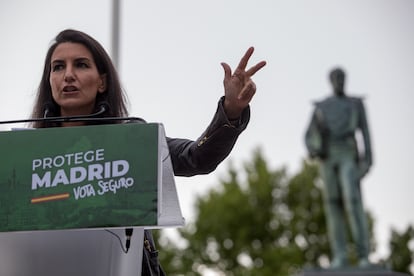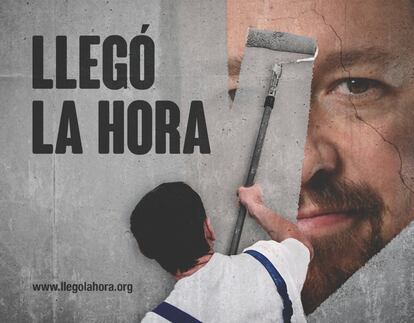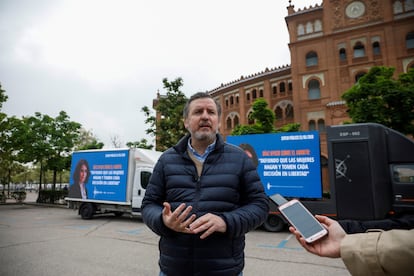Far right Vox commits to blocking access to abortion and euthanasia in Madrid
Ahead of May 4 regional election, the party has backed the agenda of the ultraconservative Catholic group Hazte Oír, which wants to repeal laws protecting LGBTQ+ rights

The Spanish far-right party Vox has committed to a set of demands made by the ultraconservative Catholic organization Hazte Oír (Make Yourself Heard) ahead of the Madrid regional elections on March 4. The six-point list includes a commitment to block access to the right to abortion and euthanasia, and to repeal regional laws protecting people against discrimination on the basis of their sexual orientation
Vox candidate Rocío Monasterio – who has a close relationship with Hazte Oír – has backed the agenda, which already closely mirrors that of the far-right party. The first point on the list is “to advance the protection of the right to life of all human beings (from conception to natural death)” – in other words, to make it more difficult to access the right to abortion and euthanasia. The Catholic lobby also wants women seeking an abortion in Madrid to be asked if they want to hear the fetus’s heartbeat – a controversial practice Vox deputy Gádor Joya has already been offering outside of abortion clinics in the region.
Hazte Oír also calls for the repeal of all regional laws that protect LGBTQ+ people from discrimination. This would end the ban on so-called “conversion therapy,” which treats homosexuality as a disease that can be cured. These practices were banned by the very laws that Hazte Oír wants repealed.
The list also calls for the introduction of the so-called “parental veto,” a policy that gives parents the right to stop their children from attending complimentary workshops organized during school hours. This measure – which was first proposed by Vox – means that schools need to ask for parents’ permission to give talks on workshops such as safe sex and LGBTQ+ rights.
Another point calls for the protection of “Christian symbols” against the supposed threat of the central government’s Democracy Memory bill, which addresses the legacy of the Spanish Civil War (1936-39) and the Francisco Franco dictatorship. This point may refer to the large cross at the Valley of the Fallen, the controversial memorial to victims of the Civil War, where Franco was buried before his body was exhumed in 2019.

Hazte Oír also wants all travel restrictions aimed at controlling the coronavirus pandemic to be lifted and for regional taxes to be frozen or lowered to compensate for a hypothetical rise in state levies. Some of the measures proposed by the Catholic lobby are already protected under Spanish law, such as the right of doctors to conscientiously object to abortions and euthanasia.
Although Monasterio has a long history with Hazte Oír – having been involved personally with several of their campaigns – she has avoided speaking on moral issues during her election campaign. When asked about the right to abortion and euthanasia, Monasterio said that Vox wants to repeal both laws, but added that the Madrid regional government does not have authority over these issues, so it was not the time to address them.
But while abortion legislation falls to the central government, how the law is carried out in practice is controlled by the regions, which is why in eight Spanish provinces – Teruel, Ávila, Palencia, Segovia, Zamora, Cuenca, Toledo and Cáceres – no abortion has been performed in three decades. In these provinces, women are sent to other territories, which delays the procedure.
It is a similar case for Spain’s newly approved euthanasia law. Under this legislation, the final decision on whether to approve a patient’s request for euthanasia or assisted suicide is made by a commission, whose members are determined by each region. “If you fill this commission with members of [ultraconservative Catholic group] Opus Dei, the entire process will turn into a trial, making it unviable,” warned a medical expert on the subject. “Almost any right that is recognized on a state level can be blocked until it is annulled on a regional level,” they added.
While Monasterio has been avoiding moral issues, Vox spokesperson Jorge Buxadé has not. Buxadé, who defends the so-called “natural family” between a man and a woman, said on Monday that freedom in Madrid will not be possible “while man continues to be a slave to his vices and passions.”
Pressure on Madrid premier
Hazte Oír has also been pushing for Madrid premier Isabel Díaz Ayuso, of the conservative Popular Party (PP), to back the agenda. The ultraconservative Catholic organization sent a letter to Díaz Ayuso’s campaign manager, Miguel Ángel Rodríguez, warning that if the Madrid premier did not commit to its demands, it would vote for someone who would – in other words, Vox candidate Rocío Monasterio. It has also plastered signs on trucks featuring a photo of Díaz Ayuso with the phrase: “I defend women making and taking each decision freely,” which she made during the television show Espejo Público in May 2019.

But before Díaz Ayuso was named premier, she also told EL PAÍS in January 2019 that “abortion is not the right of a woman.” Her other statements included: “I’m worried that the father is never considered and it is almost used as a contraceptive method” and “I am not criminalizing anybody, but a very high percentage [of women who have abortions] are immigrants or women without resources who are doing it for the second or third time.”
Although Díaz Ayuso is currently leading in the polls, it is likely she will need the support of Vox to secure an absolute majority. If the PP were to form a coalition government with Vox, Hazte Oír has made it clear that it wants the latter to set the agenda. “If Vox is strong in the Madrid Assembly, Ayuso will be more courageous and her values better represented,” the organization says on its website. “We hope that Rocío Monasterio will push Ayuso to do the right thing if the groups are able to form a government together.”
With just days to go before the Madrid vote, Hazte Oír has also put up posters against Unidas Podemos candidate Pablo Iglesias, who resigned as one of Spain’s deputy prime ministers to contest the election. The posters show a worker painting over Iglesias’s face with the message: “It’s time.”
Hazte Oír
Hazte Oír was set up in 2001 by lawyer Ignacio Arsuaga and has campaigned noisily against abortion rights, as well as attacking LGBT groups and women’s associations, using terms such as “the gay inquisition” and “the dictatorship of gender.” In 2019, the Spanish Interior Ministry withdrew Hazte Oír’s status as a not-for-profit association over its controversial campaign against transgender people.
In 2017, the ultraconservative Catholic organization organized a bus emblazoned with the message: “It’s what biology says: boys have a penis. Girls have a vulva. Say no to gender indoctrination.” The vehicle was driven across Spain and sparked fierce backlash from activists.

In 2019, Hazte Oír launched another bus, this time against “feminazis” and Spain’s gender violence law. The main message read: “It’s not gender violence, it’s domestic violence.” The bus also featured an image of Adolf Hitler wearing makeup and the symbol of feminism on his military cap, above the hashtag “#StopFeminazis.”
With reporting by Natalia Junquera.
English version by Melissa Kitson.
Tu suscripción se está usando en otro dispositivo
¿Quieres añadir otro usuario a tu suscripción?
Si continúas leyendo en este dispositivo, no se podrá leer en el otro.
FlechaTu suscripción se está usando en otro dispositivo y solo puedes acceder a EL PAÍS desde un dispositivo a la vez.
Si quieres compartir tu cuenta, cambia tu suscripción a la modalidad Premium, así podrás añadir otro usuario. Cada uno accederá con su propia cuenta de email, lo que os permitirá personalizar vuestra experiencia en EL PAÍS.
¿Tienes una suscripción de empresa? Accede aquí para contratar más cuentas.
En el caso de no saber quién está usando tu cuenta, te recomendamos cambiar tu contraseña aquí.
Si decides continuar compartiendo tu cuenta, este mensaje se mostrará en tu dispositivo y en el de la otra persona que está usando tu cuenta de forma indefinida, afectando a tu experiencia de lectura. Puedes consultar aquí los términos y condiciones de la suscripción digital.








































